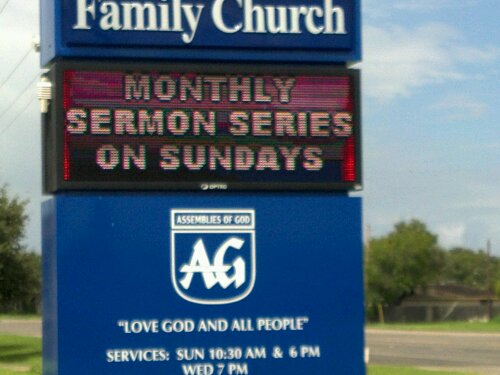Below is some verbiage from church signs that comes specifically dis-, un-, non-, and in all other ways NOT recommended.
You might note that several of these ill-advised sign examples concern congregational worship. I’ll make three advance comments about this proclivity to try to attract people by virtue of congregational worship:
- If a church is trying to proselyte members from other churches where the worship part of things presumably isn’t as cool or exciting, shame on the proselytizing church.
- If a church is under the impression that backslidden believers might be influenced by worship-related signage to say to themselves, “Hey, yeah, I really should get back to church attendance,” it might consider that worship isn’t the heart language of many of the backslidden.
- If a church is trying to bring unbelievers in, it ought to be cognizant of the fact that outsiders aren’t thinking in terms of worship, either. Messages about worship aren’t very likely to attract the unchurched.
Now, to seven non-wonders of this particular church sign revelation. . . .
“Exciting Worship”
Assuming that many inside this church think their corporate worship is exciting, I’ll bet I wouldn’t. I might instead think, “Deafening would-be worship” or “pathetic-attempts-to-look-like-you-know-what-you’re-doing-and-are-in-relationship-with-God worship.”
“Come Worship with Us”
I’m dozing already, and I haven’t gotten out from behind the wheel of my car yet.
“Monthly Sermon Series on Sundays”
Think about it: who is this sign for? Potential visitors who are interested in something interesting will avoid this church like I avoid a dead skunk on the road. And regular members who already know about the monthly series are probably monotonized by said series already. (Okay, that last statement wasn’t fair. But I couldn’t resist. For more on this particular sign, go here.)
“Praise Victory Church”
This kind of church sign seems passe to me now. 20 years ago, it was attractive — even fetchin’ — to use a label like this. These days, it just seems old hat and shallow.
For starters, it conveys the false impression that victory is yours for the mere claiming. Or, worse — that if you follow Jesus, your life should be happy or else you must be doing something wrong.
Yet more insidious is that a message like this tends to disenfranchise those who a) don’t feel like praising, b) don’t understand what praise is, c) have had their fill of churches who major in boisterous praise, d) don’t feel the need for a victory in their lives, e) have given up hope that “victory” can occur, etc. Before you take me to task for not giving credence to the notion of bona fide spiritual victory based on the atonement, pause to consider the actual, likely reason the word “victory” is on the sign. It’s not any deep reference to the Rider on the White Horse defeating the dragon; it’s likely just a feel-good, Osteenish thing.
ADDENDUM 6/23/14: I came across an apt quotation from Walter Brueggeman, OT Theologian:
The problem with a hymnody that focuses on equilibrium, coherence, and symmetry (as in the psalms of orientation) is that it may deceive and cover over. Life is not like that. Life is also savagely marked by incoherence, a loss of balance, and unrelieved asymmetry. In our time—perhaps in any time—that needs no argument or documentation. – Walter Brueggeman, “Psalms of Disorientation,” in Spirituality of the Psalms
“B A Y A R E A Fellowship”
The letter spacing on this sign was so poor — and my orientation to Latin-derived vowels and the mention of Berea in Acts so strong — that I initially had no idea this sign was referring to the Corpus Christi Bay. I pronounced it aloud within the confines of our car, and “Bay” became “Bye,” so it rhymed with “diarrhea.” Whoops.
“Come let us test your ways and examine them”
I actually saw this on a changeable church sign, and I have witnesses. I’ve seen a lot in my time, but it is beyond my comprehension that anyone could consciously post this message unless s/he had a death wish for a presumably comatose church. It’s not that passers-by shouldn’t have their ways tested, and it’s not even that this church didn’t have some healthy, well-founded judgment going for it. It’s that this is not a good idea to put on a sign.
“How To Be a Church Member”
This one happens to have appeared on a regularly changing sign that I pass regularly. And I have observed that people in this church are pretty energetic and sincere, as a rule. I even met this church’s head pastor, and he impressed me with his character and manner. But “How To Be a Church Member?” If this is what we’re conceiving and advertising, it’s no wonder no one is interested. One thing that’s wrong with the institutional church is that it wants to convert people to it and not to Jesus.
Caveat: it could very well be that the actual message spoken on this topic ended up meaty and biblically based. In other words, maybe it was really about how to be a member of the body of Christ at large, rather than being about how to be fully functioning churchman in this particular local group. In this case, I give the group points for being coy, but would seriously recommend that they get a new advertising agency. 🙂



